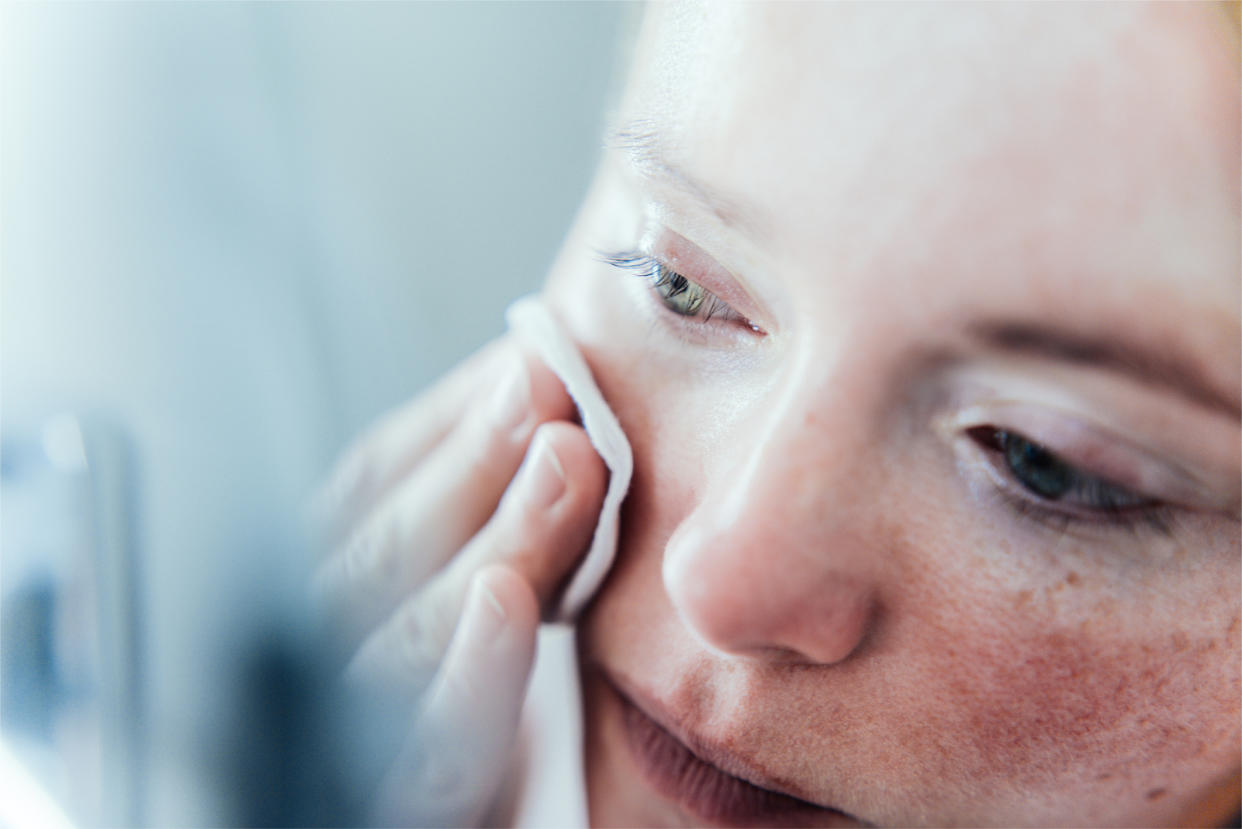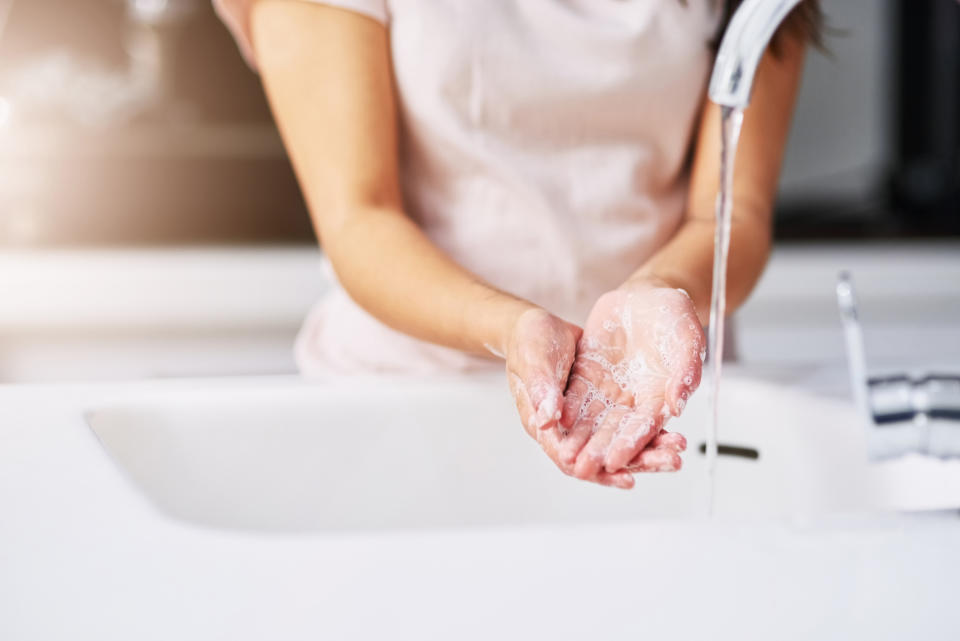Coronavirus: The impact self-isolating or working from home can have on your skin

With the UK potentially hurtling towards a nationwide lockdown and many of the workforce currently WFH, you might feel your skin will be one of the few beneficiaries of the coronavirus outbreak.
Sure skipping the daily commute will mean your skin is exposed to less pollution and self-isolating may mean you’re wearing less make-up, but spending more time indoors can also have some negative impacts on your skin.
From the regular hand-washing leaving your hands dry to harsh cleaning chemicals leaving your skin feeling irritated, there are plenty of reasons being confined to your house can play havoc with your skin.
With that in mind here’s our expert-backed guide to the surprising things that could be impacting your skin during these COVID-19-laced times and what you can do to combat them.
Repeated hand washing and sanitising
"Regular hand washing and use of hand sanitiser can cause hands to feel dry and sore and may exacerbate pre-existing skin conditions such as eczema,” explains Dr Adam Friedmann, consultant dermatologist at Stratum Clinics.
“Also the repeated use of soaps and disinfectants can give rise to 'irritant contact eczema', an eczema caused by a chemical, such as soap, irritating the skin.
This will appear as dry, cracked, itchy skin on the knuckles and in the finger web spaces.
“In addition to this if people don't always dry their hands thoroughly after washing them the water will have a drying effect on the skin by stripping the skin's natural oils when it evaporates,” he adds.
“This may especially be common amongst kids who fail to dry their hands properly.”
Read more: What to do if your wedding is impacted during the coronavirus outbreak?
Reducing hand washing is non-negotiable right now, but there are ways to reduce the impact it and the squirting of the sanitiser is having on your poor, dry hands.
“To help reduce damage caused by frequent hand washing or hand sanitiser use, most dermatologists recommend the use of aqueous cream to wash their hands and there are some preparations available that contain chlorhexidine, an anti microbial e.g. Dermol lotion,” Friedmann explains.
He also suggests moisturising the hands shortly after washing them (whether this is with regular soap and water or the application of hand sanitising gel), so this might be many times a day.
“If the hands remain unbearable, a prescription for a topical steroid ointment will probably help sooth them and minimise skin irritation,” he adds.
“If things are still not manageable, switching perhaps to a moisturising cream-based wash with antiseptic in it could help and failing that, get referred to see a consultant dermatologist!”

Central heating and scented candles
While it’s tempting to light a soothing candle during these anxious times and whack up the central heating when it is feeling chilly, both can have knock-on implications for your skin.
"The drier the air the drier our skin becomes and conditions such as eczema and psoriasis can worsen,” explains Friedmann.
“The skin will start to lack moisture and need hydrating, especially when isolating at home if people are putting on the central heating more.
“Also if people aren't going out as much they'll be having less sun exposure and so our skin can lose vital vitamin D making the skin appear dull and sallow.”
Dr Mark Hudson-Peacock, Consultant Dermatologist says this can all lead to skin becoming dehydrated.
“The skin is made up of three layers - the outer layer (the epidermis), the underlying skin (the dermis) and the subcutaneous tissue,” he explains.
“If the outermost layer of the epidermis doesn't contain enough water, skin will lose elasticity, look dry and feel rough.”
To help keep your skin hydrated Dr Hudson-Peacock suggests using a humidifier, especially when the air is drier, when the skin is more prone to dehydration.
Latest coronavirus news, updates and advice
Live: Follow all the latest updates from the UK and around the world
Fact-checker: The number of Covid-19 cases in your local area
Not drinking enough water
We know H2O helps to keep skin hydrated, but with so much else to worry about it’s possible your water intake has taken a hit, causing your skin to feel dry.
Thankfully Dr Hudson-Peacock has some tips to maintain well-hydrated skin, in these home-based times.
“Avoid prolonged contact with overly hot or cold water, especially if it contains detergents (use cotton-lined gloves for washing up, for example and when washing hands continually try and use warm water),” he says.
He also suggests patting the skin dry after rather than vigorously towelling off and using a gentle non soap containing cleanser in the bath or shower.
“Try to avoid ordinary soaps and shower gels as these remove the natural oils from the skin,” he adds.

Stress and anxiety
According to Friedmann stress and exhaustion can lower the immune system and can cause facial breakouts and premature ageing.
Though it is hard to simply reduce stress in the current climate, and mental health in itself is something to address, it does mean looking after your skin is even more important.
For tips to look after your mental health during the coronavirus click here.
Existing skin conditions
Eczema and psoriasis sufferers may experience more severe symptoms at this time, which according to Friedmann will mean they need to monitor their skin more closely, and seek efficient treatment.
“The key feature of eczema is that it is itchy so controlling the itch will be essential,” he explains.
“Ensure fingernails are kept short to prevent scratching and causing the skin to bleed and use a cold compress to relieve the itch.
“As mentioned regularly moisturise to retain the skin's moisture - when your skin gets too dry, it can easily become scaly or rough which can lead to an eczema flare up.”
Not getting enough sleep
In these anxious times, it is hardly surprising that many of us have seen our sleep impacted, but sleep is an important aspect of skin care.
While we sleep, the body regenerates and also makes collagen, so if you’re not getting enough ZZZs, your skin will be making less collagen.
Collagen is an important ingredient in the elasticity and structure of skin. When collagen is broken down, the skin shows more noticeable signs of ageing by becoming thinner and less firm.
Combat the lack of zeds by choosing a moisturiser that contains retinoids or peptides to help support collagen production.



